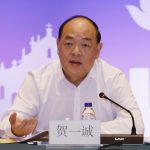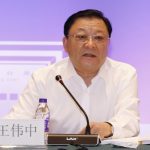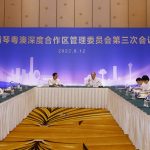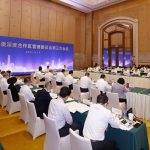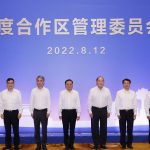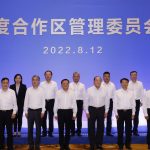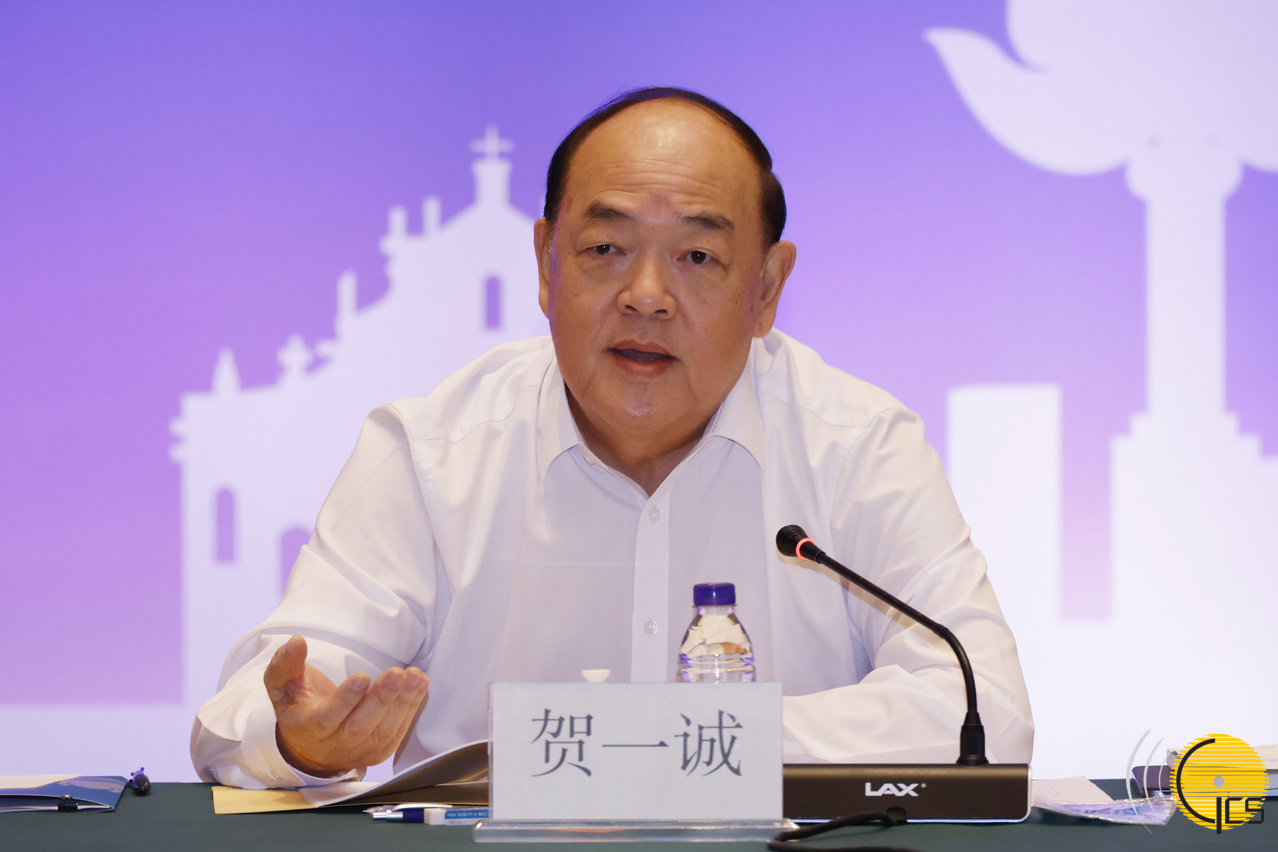 The Chief Executive of the MSAR and Director of the Administrative Committee of the Guangdong-Macao Intensive Cooperation Zone in Hengqin, Mr Ho Iat Seng, delivers a speech at the third meeting of the Administrative Committee held in Hengqin, Zhuhai.
The Chief Executive of the MSAR and Director of the Administrative Committee of the Guangdong-Macao Intensive Cooperation Zone in Hengqin, Mr Ho Iat Seng, delivers a speech at the third meeting of the Administrative Committee held in Hengqin, Zhuhai.
The Chief Executive, Mr Ho Iat Seng, raised three suggestions when he concluded the third meeting of the Administrative Committee of the Guangdong-Macao Intensive Cooperation Zone in Hengqin.
At the meeting in Hengqin, Zhuhai on Friday (12 August), the Administrative Committee reviewed a number of important documents, i.e., a work report, a budget proposal, and an investment plan. The meeting also discussed deployment regarding the next phase of work.
The meeting was jointly chaired by the Administrative Committee's two directors: the Chief Executive of the Macao Special Administrative Region (MSAR), Mr Ho Iat Seng, and the Governor of Guangdong Province, Mr Wang Weizhong.
In his speech, Mr Ho said Guangdong and Macao would continue to work closely to promote orderly advances in work put forward respectively by the Administrative Committee and the Executive Committee of the Cooperation Zone. The Cooperation Zone effort had begun well. Everyone should maintain their confidence in the creation of a better future via the Cooperation Zone, he said.
Mr Ho called on the Executive Committee of the Cooperation Zone to work hard to realise goals discussed at Friday’s meeting. The Administrative Committee would provide its strong support – in accordance with the respective function and assigned tasks of the various bodies – in order to achieve envisaged objectives.
The Chief Executive raised three suggestions as he concluded the meeting.
The first was stay true to the original mission of the Cooperation Zone and promote its steady development. As President Xi Jinping had reiterated on several occasions, the original mission of developing Hengqin was to facilitate Macao’s adequate economic diversification. The “four new” strategic positions, outlined in the Master Plan of the Development of the Guangdong-Macao Intensive Cooperation Zone in Hengqin, were targeted at realisation of the original mission.
Mr Ho detailed his insights on attracting investments and on talent importation. Regarding attraction of investment, Mr Ho stated more work should be done to boost Macao development, and to strengthen the integration of Hengqin and Macao. Investment for the Cooperation Zone should be focused on the four major industries planned there. Effort should be made to ensure that major projects to be based in the Cooperation Zone fulfilled requirements of its Master Plan. Talent importation effort should also align with the needs of the four major targeted industries and be done with a market-orientated approach.
The second suggestion shared by the Chief Executive was to take on responsibly and courageously the promotion of integration of regulations and mechanisms, and to do so in a pragmatic and efficient way. In the first half of 2022, tax incentive policies – i.e., regarding personal income tax and company income tax – had been put in place. They were effective in terms of attracting talented people to the Cooperation Zone. By the end of this year, further effort should be made to advance the special regulatory system by tier district, as well as coordinated development planning, and development of financial services.
The third suggestion made by Mr Ho was to comply strictly with the requirements for collective effort set out in the new development system; and to complement respective strengths in order to increase efficiency in decision-making. Mutual Discussion, Joint Construction, Joint Administration and Shared Benefits was a new model for cooperation not only for the Cooperation Zone but also under framework of the “One country, two systems” principle. The four elements constituted the major advantage of the Cooperation Zone. Advances relating to development of enterprises were key to the idea of “joint construction and shared benefit”. It was therefore important to speed up relevant progress, to implement in an orderly way the introduction of the four major targeted industries.
Addressing in the meeting, Governor Wang said the Cooperation Zone had seen pragmatic and progressive effort applied in the year since it was officially launched. Guangdong and Macao should bear in mind the instructions of President Xi, in order to ensure the Cooperation Zone was developed in the direction pointed to by the President.
Mr Wang mentioned the need to review the Master Plan with a view to further integrating Hengqin and Macao. This was in order to embrace high-quality opening up, and a higher level of market-access system. More work should be done to accelerate development of an investment entity for the Cooperation Zone. This would be in a bid to attract major enterprises and large projects to set up a base in the Cooperation Zone, encompassing integrated circuit technology; traditional Chinese medicine; and new energy and new materials; as well as fields relating to the four major targeted industries.
It was necessary to: speed up construction of major projects in the Cooperation Zone; accelerate construction of customs inspection facilities for “Second-tier” tariff channels; and promote work for an extension line to the Guangzhou-Zhuhai Intercity Railway and for a high-speed rail connection to the Guangdong-Zhuhai-Macao high speed rail project, said Mr Wang. It was also necessary to make good use of systems relating to delegation of powers and to special relaxed measures regarding market access. The Cooperation Zone was striving to implement further favourable policies. All these efforts were to build the Cooperation Zone as a new part of the Macao community, with convenient conditions to live and work, Mr Wang added.
During Friday’s meeting, the Secretary for Economy and Finance of the MSAR and Chairman of the Cooperation Zone's Executive Committee, Mr Lei Wai Nong, reported on the work done so far in 2022. The meeting also passed the 2022 budget proposal for the Cooperation Zone; and the 2022 investment plan from the Executive Committee of the Cooperation Zone; and discussed issues relating to the sale of state land lot No. 2021-01 (integrated logistics centre in Hengqin).


